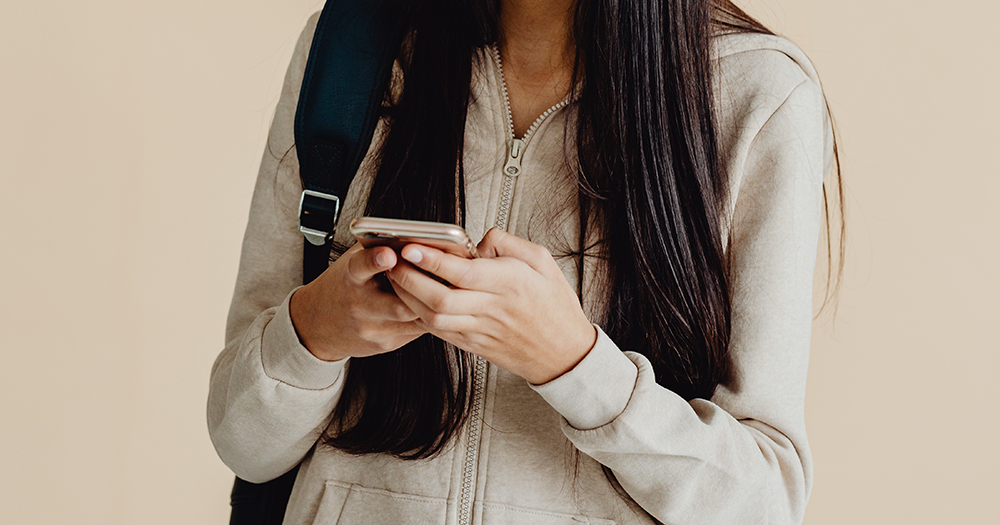As part of Belong To’s It’s Our Social Media campaign, we are platforming the experiences of LGBTQ+ youth online throughout the month of March. Below, 18-year-old Aoibhín Copeland shares the importance of engaging with positive content on social media.
As an LGBTQ+ young person in Ireland, I recognise both the positives and negatives associated with social media.
During lockdown, I saw an ad on Instagram to join an online youth group run by Limerick Youth Service. I decided to message the account and I was told that this group ran weekly on Zoom. Although I was nervous about meeting new people, I found that it was a great way to get outside my comfort zone to meet and connect with people I wouldn’t have otherwise met.
Through platforms like Instagram and Snapchat, I have also been able to stay in contact with friends I’ve made through an in-person LGBTQ+ youth group I joined last year and with people I met through Clare Youth Services.
https://twitter.com/Belong_To/status/1632669804887695360
I strongly believe that social media is especially important for the LGBTQ+ community. Personally, I think that queer content creators inform and empower young people all over the world. One example would be Jamie Raines (jammidodger). He raises awareness about and discusses a variety of topics related to the trans community and also talks about his own experience of socially and medically transitioning. He combats myths about transgender people with the truth, which I think is essential for the queer youth who view his content.
Another example would be Cian Griffin (@gaylgeoiri), an Irish content creator. He promotes the Irish language by posting videos, vocabulary, and relatable memes ‘as Gaeilge’. He is also part of Na Gaeil Aeracha, an LGBTQ+-inclusive GAA club in Dublin. His love for Irish and his pride in himself makes him a positive content creator to follow.
Social media is also essential for the queer community as it gives us access to LGBTQ+ news outlets. This allows people to be more aware of news specific to the queer community that sometimes wouldn’t be discussed on mainstream outlets. GCN is Ireland’s free LGBTQ+ media. It keeps people updated on the latest news, entertainment and upcoming events. I believe this is extremely important as it sparks conversations about the lives of LGBTQ+ people, and it gives queer people a platform to tell their own stories.
On the other hand, social media can also result in young people experiencing online harassment. Social media is convenient and easy to use but also powerful and often dangerous. While social media can be a useful tool for keeping in contact with people, it is also used to spread hate and expose young people to hurtful comments.
As a young person, I do my best to limit the amount of negativity I view on my social media. I do this by having a private account. This gives me the power to only accept follow requests from people I know. It also limits the number of people who have access to my profile, lowering the possibility of receiving hateful comments and unwanted messages.
I feel like young people need to follow accounts that spread both positivity and kindness. This reduces the possibility of witnessing anti-LGBTQ+ content online. It is essential for people to recognise and only follow influencers and content creators who intend to share positive messages and take care and consideration before posting on social media.
Another way to stay safe online would be to report and block people who could potentially or have posted content that is hurtful and hateful towards any particular person or community. These types of people can also be avoided by not accepting follow requests from people you don’t know, accounts with no profile picture, or those without a bio. These kinds of red flags mean that you are unaware of the kind of content they post and the kind of person they are. Blocking and reporting features are available on popular social media sites, including Facebook, Instagram, Twitter and Snapchat.
https://twitter.com/Belong_To/status/1638117269854121984
I strongly believe that we can promote positive content to make social media a better place for LGBTQ+ young people. This can be done by sharing and supporting individuals or organisations online that strive to make social media more diverse and more inclusive. These can include youth organisations, charities and content creators who aim to highlight not just the issues and problems faced by queer people, but also the uniqueness, individuality and strength of each LGBTQ+ young person in Ireland today.
© 2023 GCN (Gay Community News). All rights reserved.
Support GCN
GCN is a free, vital resource for Ireland’s LGBTQ+ community since 1988.
GCN is a trading name of National LGBT Federation CLG, a registered charity - Charity Number: 20034580.
GCN relies on the generous support of the community and allies to sustain the crucial work that we do. Producing GCN is costly, and, in an industry which has been hugely impacted by rising costs, we need your support to help sustain and grow this vital resource.
Supporting GCN for as little as €1.99 per month will help us continue our work as Ireland’s free, independent LGBTQ+ media.

comments. Please sign in to comment.